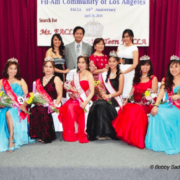THE sun was blasting down ferociously on the pavement in this hottest April day, brimming with heat.
Historic Filipinotown was melting, heaving and breathing like a tired beast.
Here on Temple Street, FACLA is a world on its own.
Times change, so does a man I remember with clarity — the urbane gentleman’s countenance was almost as clear as the substance of our talk, as if it were an important meeting.
With Austin Baul, something old has gone out and a new one has come in.
They have elected a president who fights for the powerless, as he moves FACLA into the right direction.
His enormous intelligence and great sense of commitment are surpassed only by his heart and generosity of spirit.
He constantly reminds us all that “we’re not here to make a point, but to make a difference: and bring a new life.”
President Baul has gracefully agreed to continue the saga of FACLA.
In an astonishingly short time, he transformed a moribund, mediocre, intolerable organization into a vital, exciting and invaluable part of the Fil-Am cultural and community life.
He recalls his first day when he could hardly wait to get to his office and find his desk loaded with problem of every kind.
On his first day of crisis (with hundreds to follow) there was no decision that does not reflect itself executively in human terms.
It can’t be departmentalized and it is imperative that final decisions or matters rest in one hand — from conflicting directions, to budget allocation, to disciplining irresponsible members.
Everyone expects a prestigious organization’s leaders to be able to delegate and to listen to his board and members. Naturally, when opinions differ, it is he who decides.
His word is gold. He walks into a meeting and it becomes an occasion. FACLA continues to have a contagion of problems.
Behind sealed doors, Mr. Baul speaks with local government officials, possible supporters, businessmen and ordinary members.
Sometimes his voice would rise and screech. He sat, slightly nodded and leaned when he was alternately amused and provoked. But he charmed them all with his sincerity and frictionless certitude of his belief.
The Filipino Cultural Center
The Filipino Community of Los Angeles Center is dedicated to the Fil-Am youth of today and tomorrow — to generate interest in them towards our rich cultural heritage, to perpetuate the ideals of our forefathers, and to promote greater harmony in our own society.
It is equally dedicated to all past presidents, officers and loyal member of the organization through the years. With their unwavering spirit and perseverance, they have made this center possible.
Benjamin Manibog was President (1965) and one of the most popular PR persons was “Uncle” Larry Perkins.
The transition
It was called FACLA’s coming of age — when leaders weighed down with a sense of guilt about the seniors. It became a place of togetherness and belongingness — where they regularly danced, held birthday parties and beauty contests.
That sense of importance and worth they feel they earned was never denied any president – regardless of how turbulent and fragmented their reigns were.
For years, it was a seniors’ haven, even if the hundreds or more seniors thrown together engendered the same friction which stirs other groups: competitiveness, jealousy, pique, hurt feelings, obsession and inferiority outrage — causing unnecessary stress for all the officers.
This can and do explode periodically — the tumultuous time of FACLA’s fragmented souls: the elders were not there waiting for death, but for each day to come.
Today, it has come a long way.
Bernie Targa-Ganon recently organized the new FACLA Youth Cultural Club. The club involves the youth in cultural activities — from folk dancing, to disco and rock on Friday nights. The dance floor becomes filled with magnet scholars and young athletes.
A beguiling mixture of grace and enormous versatility, Bernie is an educator, trainer and lecturer, whose teachings on cultural events revolve on tradition, quest and experiment.
A former beauty queen and commissioner of culture and athletics back home (she has danced with the Bayanihan), Bernie has decades of experience in inspiring creativity and diligence.
The unique beauty contest she presented was a total hit, a concept unheard of.
Aware of the enormous hunger of people for beauty, her event evoked a community of feelings that developed the spirit while it nourished the eye – so far away from a culture absorbed in itself. It was a unique, remarkable feat of collective selflessness, a first of its kind.
As the night wore on, toasts were made, dances danced, pictures posted (the PPP-USA were superb), speeches were delivered amid the gentle roar of the last dance. The audience bowed to the heart-stirring ovation for FACLA.







